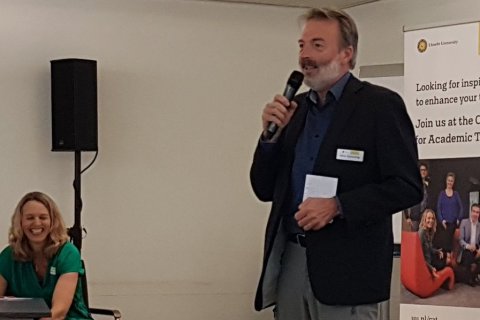Flexible education?! Lifelong Learning?!
Review 24-hour educational conference

"There is enormous momentum in the development of our academic education. I am therefore very pleased that those responsible for education are meeting each other across borders in order to improve the quality of our education. The issue of flexibility is a matter of concern on all sides. Students are asking for it and are calling on us to find out which programmes are eligible for 'flex-studying', the pilots supported by the Ministry of Education, Culture and Science. Hereby!" With these words, rector-magnificus Henk Kummeling opened the 24-hour educational conference on Tuesday 11 June 2019 at Landgoed De Horst in Driebergen. The annual conference at which educational managers, vice-deans, Senior Fellows and education policy officers at the University of Utrecht reflect on the future of academic education in Utrecht.
Many students call for flexible education in order to combine study and work, to be able to follow other study paths and educational pathways, and to study at different times and in different tempi. Will a three-year bachelor's programme after high school and directly followed by a full-time master's programme remain the standard route in the future?
Online teaching makes flexibility possible
Rick Grobbee, Professor of Clinical Epidemiology at the UMCU, introduced the 24-hour conference with an example. With the desire to make education possible in developing countries in mind, he found a way of organising education flexibly. By offering education online via Elevate, students could follow education all over the world, at any time. "Online teaching has drastically changed the educational landscape: through economies of scale, the opportunity to offer more tailor-made education and the opportunities to become a global player," says Rick Grobbee. “This has consequences for the teacher. With all the technologies we have at our disposal, the role of teacher will shift to director, from pilot to air traffic controller.”
Relationship with Lifelong Learning
A theme that is closely related to flexibilisation is lifelong learning. To what extent does our model of university education fit in with the dynamics of the market for professionals and the lives of graduates? How can the university meet the needs of alumni and working professionals to continue learning? In what form, at what times and at what pace do they want to learn? These target groups, too, call for greater flexibility and customisation in academic education.
Dialogue with professional groups and society
During the 24-hour conference, knowledge was shared about training courses and projects within the UU where forms of flexibilisation are already being applied and the participants gained inspiration from each other. Groups brainstormed about the consequences for the quality assurance of education and about other forms of accreditation. On the second day, the participants divided up per faculty to discuss how education can be organised in consultation with relevant professional groups and social organisations in order to be able to respond to where and why our knowledge is important and what need (content and form) there is for training. A lot of material to think about after the inspiring conference and to get started!
Publications on this theme:
- Binnen universiteiten wordt leven lang leren standaard - ScienceGuide - door Wieger Bakker
- Onderwijs-op-maat (SURF)

